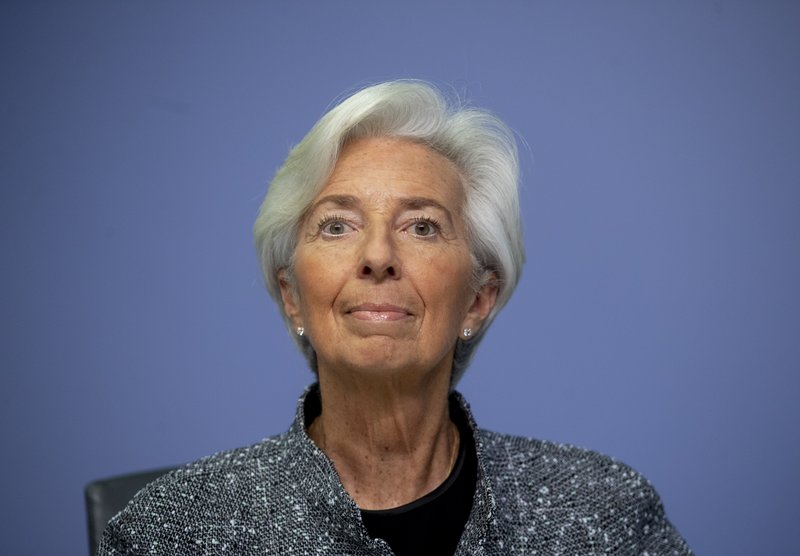
FRANKFURT, Germany (AP) — The European Central Bank has boosted its pandemic emergency support program by an unexpectedly large 600 billion euros to 1.35 trillion euros (US$1.5 trillion) in an effort to keep affordable credit flowing to the economy during the steep downturn caused by the virus outbreak.
The new stimulus comes on top of added spending by European governments and similar efforts by the US Federal Reserve, the Bank of England, the Bank of Japan and others around the globe as the world tries to cope with a sharp, simultaneous blow to both developing and rich economies.
The central bank for the 19 countries that use the euro also extended its monetary stimulus program to at least the end of June next year, from the end of 2020 currently.
The bank expects the eurozone economy to shrink by a painful 8.7 percent this year and to recover by a more modest 5.2 percent in 2021. President Christine Lagarde warned that “the speed and scale of the rebound are highly uncertain.”
Lagarde removed a face mask as she walked into an empty press room at the bank’s skyscraper headquarters in Frankfurt for the online news conference after the policy meeting of the bank’s 25-member governing council, which was conducted by teleconference.
She cautioned that even though lockdown measures are being eased, a significant rebound was not yet in sight.
“While survey data and real-time indicators for economic activity have shown some signs of a bottoming-out alongside the gradual easing of the containment measures, the improvement has so far been tepid compared with the speed at which the indicators plummeted in the preceding two months,” she said.
The ECB’s moves in many ways reflect similar concerns to those motivating the Fed, which has slashed short-term interest rates to near zero and started buying two trillion dollars in Treasury securities and mortgage-backed bonds to keep credit markets functioning.
Under the pandemic support program, the ECB buys corporate and government bonds and other financial assets from banks, paying with newly created money. That helps lower longer-term interest rates, keeping the pandemic from drying up needed funding for borrowers.
The large size of the intended purchases also sends a signal to financial markets that the ECB is determined to ensure interest rates remain low throughout the eurozone and prevent borrowing costs from rising for indebted governments such as Italy.
While the ECB says its purchases are not targeted at supporting Italy, the program so far bought a larger share of Italian bonds than for other countries and is credited with keeping market pressure off a nation that has been among the hardest hit by the pandemic.
Italy’s lockdown will cost it lost tax revenues and additional spending to support the economy. That means added borrowing that will boost its already large debt pile of 135 pecent of annual economic output. Any investor doubts about Italy’s ability to pay could lead to a spiral of higher borrowing costs and trigger a financial crisis similar to the one that led to Greece and four other member governments needing international bailouts in 2010-2015.
The support from the ECB comes on top of up to 540 billion euros in financial aid from eurozone governments that includes credit lines from the euro bailout fund, as well as a longer-term EU recovery fund of 750 billion euros that is still being worked out. Germany, the largest member economy, on Wednesday proposed an additional 130 billion euros of stimulus including tax breaks and subsidies for buying electric cars.
The different support packages aim to cushion what the European Union’s executive commission says will be a steep fall of 7.75 percent in economic output this year and to support a recovery in coming years.
The central bank left its key interest rate benchmarks unchanged at record lows on Thursday. The rate at which the ECB lends to banks is zero. Its rate on deposits left overnight by commercial banks is now minus 0.5 percent, a penalty aimed at pushing banks to lend the excess cash. The bank has also set up long-term offers of credit to banks at even lower rates if they show they are lending to companies. Banks are key to the entire eurozone economy because most companies get their operating funds from them rather than borrowing on financial markets as is more the case in the US.
The bank said it would continue an earlier bond-purchase program started before the pandemic. Those purchases will continue to run at 20 billion euros per month, providing still more monetary stimulus.
___
Image: In this Thursday, March 12, 2020 file photo the President of European Central Bank Christine Lagarde looks up prior to a press conference following a meeting of the ECB governing council in Frankfurt, Germany. The European Central Bank has boosted its pandemic emergency support program by 600 billion euros to 1.35 trillion euros ($1.5 trillion) in an effort to keep affordable credit flowing to the economy during the steep downturn caused by the virus outbreak. (AP Photo/Michael Probst, file)




